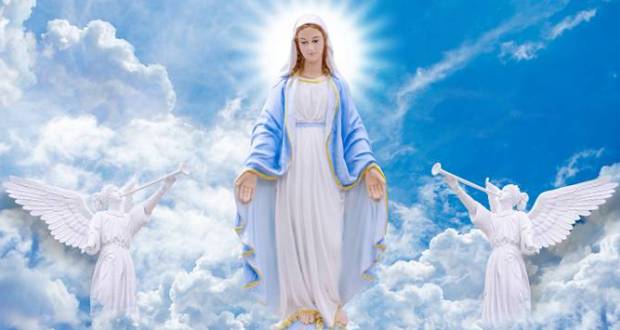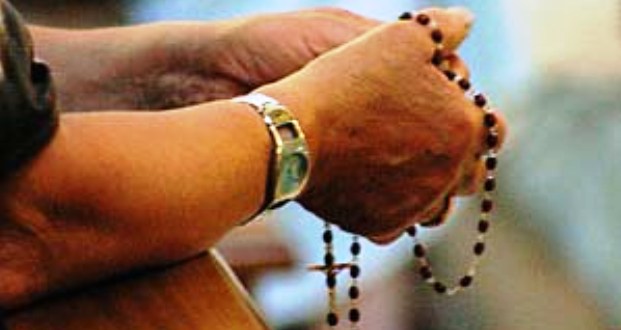The Secret Of The Rosary – Third Decade – Part 2


Twenty-sixth Rose
Whatever you do, do not be like a certain pious but self-willed lady in Rome, so often referred to by speakers on the Rosary. She was so devout and fervent that she put to shame by her holy life even the strictest religious in the Church.
Having decided to ask St. Dominic’s advice about her spiritual life, she made her confession to him. For penance he gave her one Rosary to say and advised her to say it every day. She excused herself, saying that she had her regular exercises, that she made the Stations of Rome every day, that she wore sack-cloth as well as a hair-shirt, that she gave herself the discipline several times a week, that she often fasted and did other penances. Saint Dominic urged her over and over again to take his advice and say the Rosary, but she would not hear of it. She left the confessional, horrified at the methods of this new spiritual director who had tried so hard to persuade her to take up a devotion for which she had no taste.
Later on, when she was at prayer she fell into ecstasy and had a vision of her soul appearing before the Supreme Judge. Saint Michael put all her penances and other prayers on one side of the scales and all her sins and imperfections on the other. The tray of her good works were greatly outweighed by that of her sins and imperfections.
Filled with alarm, she cried for mercy, imploring the help of the Blessed Virgin, her gracious advocate, who took the one and only Rosary she had said for her penance and dropped it on the tray of her good works. This one Rosary was so heavy that it weighed more than all her sins as well as all her good works. Our Lady then reproved her for having refused to follow the counsel of her servant Dominic and for not saying the Rosary every day.
As soon as she came to herself she rushed and threw herself at the feet of Saint Dominic and told him all that had happened, begged his forgiveness for her unbelief, and promised to say the Rosary faithfully every day. By this means she rose to Christian perfection and finally to the glory of everlasting life.
You who are people of prayer, learn from this the power, the value and the importance of this devotion of the holy Rosary when it is said with meditation on the mysteries.
Few saints have reached the same heights of prayer as Saint Mary Magdalene, who was lifted up to heaven by angels each day, and who had the privilege of learning at the feet of Jesus and his holy Mother. Yet one day, when she asked God to show her a sure way of advancing in his love and arriving at the heights of perfection, he sent the archangel St. Michael to tell her, on his behalf, that there was no other way for her to reach perfection than to meditate on our Lord’s passion. So he placed a cross in the front of her cave and told her to pray before it, contemplating the sorrowful mysteries which she had seen take place with her own eyes.
The example of Saint Francis de Sales, the great spiritual director of his time, should spur you on to join the holy confraternity of the Rosary, since, great saint though he was, he bound himself by vow to say the whole Rosary every day for as long as he lived.
Saint Charles Borromeo also said it every day and strongly recommended this devotion to his priests and clerics in seminaries and to all his people.
Blessed Pius V, one of the greatest popes who have ever ruled the Church, used to say the Rosary every day. Saint Thomas of Villanova, Archbishop of Valencia, Saint Ignatius, Saint Francis Xavier, Saint Francis Borgia, Saint Teresa and Saint Philip Neri, as well as many other great men whom I do not mention, were greatly devoted to the Rosary.
Follow their example; your spiritual directors will be very pleased, and if they are aware of the benefits which you can derive from this devotion, they will be the first to urge you to adopt it.
Twenty-seventh Rose
To encourage you still more in this devotion practised by so many holy people, I should like to add that the Rosary recited with the meditation of the mysteries brings about the following marvellous results:
-
it gradually brings us a perfect knowledge of Jesus Christ;
-
it purifies our souls from sin;
-
it gives us victory over all our enemies;
-
it makes the practice of virtue easy;
-
it sets us on fire with the love of our Lord;
-
it enriches us with graces and merits;
-
it supplies us with what is needed to pay all our debts to God and to our fellow-men, and finally, it obtains all kinds of graces from God.
The knowledge of Jesus Christ is the science of Christians and the science of salvation; it surpasses, says Saint Paul (Phil. 3:8), all human sciences in value and perfection:
-
because of the dignity of its object, which is a God-man, compared to whom the whole universe is but a drop of dew or a grain of sand;
-
because of its utility to us; human sciences only fill us with the wind and emptiness of pride;
-
because of its necessity; for no one can be saved without the knowledge of Jesus Christ, while a person who knows absolutely nothing of any other science will be saved as long as he is enlightened by the knowledge of Jesus Christ.
Blessed is the Rosary which gives us this science and knowledge of our Blessed Lord through our meditations on his life, death, passion and glory.
The Queen of Sheba, lost in admiration at Solomon’s wisdom, cried out, “Blessed are your attendants and your servants who are always in your presence and hear your wisdom” (1 Kgs. 10:8). But happier still are the faithful who carefully meditate on the life, virtues, sufferings and glory of our Saviour, because by this means they can gain perfect knowledge of him, in which eternal life consists.
Our Lady revealed to Blessed Alan that no sooner had Saint Dominic begun preaching the Rosary than hardened sinners were touched and wept bitterly over their grievous sins. Young children performed unbelievable penances, and everywhere he preached the Rosary such fervour was aroused that sinners changed their lives and edified everyone by their penances and the amendment of their lives.
If by chance your conscience is burdened with sin, take your Rosary and say at least a part of it in honour of some of the mysteries of the life, passion, and glory of Jesus Christ, and you can be sure that, while you are meditating on these mysteries and honouring them, he will show his sacred wounds to his Father in heaven. He will plead for you and obtain for you contrition and the forgiveness of your sins. One day our Lord said to Blessed Alan, “If only these poor wretched sinners would say my Rosary often, they would share in the merits of my passion, and I would be their Advocate and would appease the justice of God.”
This life is a continual war and a series of temptations; we do not have to contend with enemies of flesh and blood, but with the very powers of hell (Eph. 6:12). What better weapon could we possibly use to combat them than the prayer which our great Leader has taught us, than the Angelic Salutation which has put the devils to flight, destroyed sin and renewed the world? What better weapon could we use than meditation on the life and passion of Jesus Christ? For, as Saint Peter tells us, it is with this thought that we must arm ourselves, in order to defend ourselves against the very same enemies whom he has conquered and who molest us every day.
“Ever since the devil was crushed by the humility and the passion of Jesus Christ,” says Cardinal Hugues, “he has been practically unable to attack a soul that is armed with meditation on the mysteries of our Lord’s life, and, if he does trouble such a soul, he is sure to be shamefully defeated.” “Put on the armour of God so as to be able to resist the attacks of the devil” (Eph. 6:11).
So arm yourself with the arms of God, with the holy Rosary, and you will crush the devil’s head and stand firm in the face of all his temptations. That is why even a pair of rosary beads is so terrible to the devil, and why the saints have used them to fetter him and drive him from the bodies of those who were possessed. Such happenings have been recorded more than once.
Blessed Alan relates that a man he knew had tried desperately all kinds of devotions to rid himself of the evil spirit which possessed him, but without success. Finally, he thought of wearing his rosary round his neck, which eased him considerably. He discovered that whenever he took it off the devil tormented him cruelly, so he resolved to wear it night and day. This drove the evil spirit away forever because he could not bear such a terrible chain. Blessed Alan also testifies that he delivered a great number of those who were possessed by putting a rosary round their necks.
Father Jean Amât, of the Order of St. Dominic, was giving a series of Lenten sermons in the Kingdom of Aragon one year, when a young girl was brought to him who was possessed by the devil. After he had exorcised her several times without success, he put his rosary round her neck. Hardly had he done so when the girl began to scream and cry out in a fearful way, shrieking, “Take it off, take it off; these beads are tormenting me.” At last, the priest, filled with pity for the girl, took his rosary off her.
The very next night, when Fr. Amât was in bed, the same devils who had possession of the girl came to him, foaming with rage and tried to seize him. But he had his rosary clasped in his hand and no efforts of theirs could wrench it from him. He beat them with it very well indeed and put them to flight, crying out, “Holy Mary, Our Lady of the Rosary, come to my help.”
The next day on his way to the church, he met the poor girl, still possessed; one of the devils within her started to jeer at him, saying, “Well, brother, if you had been without your rosary, we should have made short shrift of you.” Then the good Father threw his rosary round the girl’s neck without more ado, saying, “By the sacred names of Jesus and Mary his holy Mother, and by the power of the holy Rosary, I command you, evil spirits, to leave the body of this girl at once.” They were immediately forced to obey him, and she was delivered from them.
These stories show the power of the holy Rosary in overcoming all sorts of temptations from the evil spirits and all sorts of sins, because these blessed beads of the Rosary put devils to rout.
Twenty-eighth Rose
St. Augustine assures us that there is no spiritual exercise more fruitful or more useful than the frequent reflection on the sufferings of our Lord. Blessed Albert the Great, who had St. Thomas Aquinas as his student, learned in a revelation that by simply thinking of or meditating on the passion of Jesus Christ, a Christian gains more merit than if he had fasted on bread and water every Friday for a year, or had beaten himself with the discipline once a week till blood flowed, or had recited the whole Book of Psalms every day. If this is so, then how great must be the merit we can gain from the Rosary, which commemorates the whole life and passion of our Lord?
Our Lady one day revealed to Blessed Alan de la Roche that, after the holy sacrifice of the Mass, which is the first and most living memorial of our Lord’s passion, there was indeed no more excellent devotion or one of greater merit than that of the Rosary, which is like a second memorial and representation of the life and passion of Jesus Christ.
Fr. Dorland relates that in 1481 (the date given in the manuscript is 1481, but it should be 1431) our Lady appeared to the Venerable Dominic, a Carthusian devoted to the holy Rosary, who lived at Treves, and said to him:
“Whenever one of the faithful, in a state of grace, says the Rosary while meditating on the mysteries of the life and passion of Christ, he obtains full and entire remission of all his sins.”
She also said to Blessed Alan, “I want you to know that, although there are numerous indulgences already attached to the recitation of my Rosary, I shall add many more to every five decades for those who, free from serious sin, say them with devotion, on their knees. And whosoever shall persevere in the devotion of the holy Rosary, with its prayers and meditations, shall be rewarded for it; I shall obtain for him full remission of the penalty and the guilt of all his sins at the end of his life.
And let this not seem incredible to you; it is easy for me because I am the Mother of the King of heaven, and he calls me full of grace. And being filled with grace, I am able to dispense it freely to my dear children.”
St. Dominic was so convinced of the efficacy of the Rosary and its great value that, when he heard confessions, he hardly ever gave any other penance, as we have seen in the story I told you of the lady in Rome to whom he gave only a single Rosary.
St. Dominic was a great saint and other confessors also ought to walk in his footsteps by asking their penitents to say the Rosary with meditation on the sacred mysteries, rather than giving them other penances which are less meritorious and less pleasing to God, less likely to help them to advance in virtue, and not as efficacious in helping them to avoid sin. Moreover, while saying the Rosary, people gain numerous indulgences which are not attached to many other devotions.
As Abbot Blosius says, “The Rosary, with meditation on the life and passion of Christ, is certainly most pleasing to our Lord and his blessed Mother and is a very successful means of obtaining all graces; we can say it for ourselves as well as for those who have been recommended to our prayers and for the whole Church. Let us turn, then, to the holy Rosary in all our needs, and we shall infallibly obtain the graces we ask for from God to attain our salvation.”
Twenty-ninth Rose
There is nothing more divine, according to the mind of St. Denis, nothing more noble or agreeable to God than to cooperate in the work of saving souls and to frustrate the devil’s plans for ruining them. The Son of God came down to earth for no other reason than to save us. He upset Satan’s empire by founding the Church, but the devil rallied his strength and wreaked cruel violence on souls by the Albigensian heresy, by the hatred, dissensions and abominable vices which he spread throughout the world in the eleventh century.
Only severe remedies could possibly cure such terrible disorders and repel Satan’s forces. The Blessed Virgin, protectress of the Church, has given us a most powerful means for appeasing her Son’s anger, uprooting heresy and reforming Christian morals, in the Confraternity of the Holy Rosary, as events have shown. It has brought back charity and the frequent reception of the sacraments as in the first golden centuries of the Church, and it has reformed Christian morals.
Pope Leo X said in his bull that this Confraternity had been founded in honour of God and of the Blessed Virgin as a wall to hold back the evils that were going to break upon the Church.
Gregory XIII said that the Rosary was given us from heaven as a means of appeasing God’s anger and of imploring the intercession of our Lady.
Julius III said that the Rosary was inspired by God that heaven might be more easily opened to us through the favours of our Lady.
Paul III and Blessed Pius V declared that the Rosary was given to the faithful in order that they might have spiritual peace and consolation more easily. Surely everyone will want to join a confraternity which was founded for such noble purposes.
Father Dominic, a Carthusian, who was deeply devoted to the holy Rosary, had a vision in which he saw heaven opened and the whole heavenly court assembled in magnificent array. He heard them sing the Rosary in an enchanting melody, and each decade was in honour of a mystery of the life, passion, or glory of Jesus Christ and his holy Mother. Fr. Dominic noticed that whenever they pronounced the holy name of Mary they bowed their heads, and at the name of Jesus they genuflected and gave thanks to God for the great good he had wrought in heaven and on earth through the holy Rosary. He also saw our Lady and the Saints present to God the Rosaries which the Confraternity members say here on earth. He noticed too that they were praying for those who practice this devotion. He also saw beautiful crowns without number, which were made of sweet-smelling flowers, for those who say the Rosary devoutly. He learned that by every Rosary that they say they make a crown for themselves which they will be able to wear in heaven.
This holy Carthusian’s vision is very much like that which the Beloved Disciple had, in which he saw a great multitude of angels and saints, who continually praised and blessed Jesus Christ for all that he had done and suffered on earth for our salvation. And is not this what the devout members of the Rosary Confraternity do?
It must not be imagined that the Rosary is only for women, and for simple and unlearned people; it is also for men and for the greatest of men. As soon as St. Dominic acquainted Pope Innocent III with the fact that he had received a command from heaven to establish the Confraternity of the Holy Rosary, the Holy Father gave it his full approval, urged St. Dominic to preach it, and said that he wished to become a member himself. Even Cardinals embraced the devotion with great fervour, which prompted Lopez to say, “Neither sex nor age nor any other condition has kept anyone from devotion to the Rosary.”
Members of this Confraternity have come from all walks of life: dukes, princes, kings, as well as prelates, cardinals and Sovereign Pontiffs. It would take too long to list them in this little book. If you join this Confraternity, dear reader, you will share in their devotion and their graces on earth and their glory in heaven. “Since you are united to them in their devotion, you will share in their dignity.”
Thirtieth Rose
If privileges, graces and indulgences of a confraternity make it valuable to us, then that of the Rosary is the one to be most recommended, since it is the most favoured and enriched with indulgences, and ever since its inception there has hardly been a Pope who has not opened the treasures of the Church to enrich it with further privileges. And since example is more persuasive than words and favours, the Holy Fathers have found that there was no better way to show their high regard for this holy Confraternity than to join it themselves.
Here is a short summary of the indulgences which they wholeheartedly granted to the Confraternity of the Holy Rosary, and which were confirmed again by our Holy Father Pope Innocent XI on 31st July 1679, and received and made public by the Archbishop of Paris on 25th September of the same year:
-
Members may gain a plenary indulgence on the day of joining the Confraternity;
-
A plenary indulgence at the hour of death;
-
For each rosary of five decades recited: ten years and ten quarantines;
-
Each time that members say the holy names of Jesus and Mary devoutly: seven days’ indulgence;
-
For those who assist with devotion at the procession of the holy Rosary: seven years and seven quarantines of indulgence;
-
Members who have made a good confession and are genuinely sorry for their sins may gain a plenary indulgence on certain days by visiting the Rosary Chapel in the church where the Confraternity is established. This may be gained on the first Sunday of every month, and on the feasts of our Lord and our Lady;
-
To those who assist at the Salve Regina: a hundred days’ indulgence;
-
To those who openly wear the rosary out of devotion and to set a good example: a hundred days’ indulgence;
-
Sick members who are unable to go to church may gain a plenary indulgence by going to confession and Communion and by saying that day the whole Rosary, or at least five decades;
-
The Sovereign Pontiffs have shown their generosity towards members of the Rosary Confraternity by allowing them to gain the indulgences attached to the Stations of the Cross by visiting five altars in the church where the Rosary Confraternity is established, and by saying the Our Father and Hail Mary five times before each altar, for the well-being of the Church. If there are only one or two altars in the Confraternity church, they should say the Our Father and Hail Mary twenty-five times before one of them.
This is a wonderful favour granted to Confraternity members, for in the Station Churches in Rome plenary indulgences can be obtained, souls can be delivered from purgatory, and many other important remissions can be gained, and these are available to members without trouble, without expense, and without leaving their own country. And even if the Confraternity is not established in the place where the members live, they can gain the very same indulgences by visiting five altars in any church. This concession was granted by Leo X.
The Sacred Congregation of Indulgences drew up a list of certain definite days on which those outside the city of Rome could gain the indulgences of the Stations of Rome. The Holy Father approved this list on March 7th, 1678, and commanded that it be strictly observed. These indulgences can be gained on the following days:
All the Sundays of Advent; each of the three Ember Days; Christmas Eve, and the Masses of midnight, of the Dawn and of the Day; the feasts of St. Stephen, St. John the Evangelist, the Holy Innocents, the Circumcision and the Epiphany; the Sundays of Septuagesima, Sexagesima, Quinquagesima, and every day from Ash Wednesday to Low Sunday inclusively; each of the three Rogation days; Ascension; the vigil of Pentecost, and every day of its octave; and the three days of the September Ember Days.
Dear brothers and sisters of the Confraternity, there are numerous other indulgences which you can gain. If you want to know about them, read the complete list of indulgences which have been granted to the members of the Confraternity. You will see there the names of the popes, the year in which they granted the indulgence, and many other particulars which I have not been able to include in this little summary.






